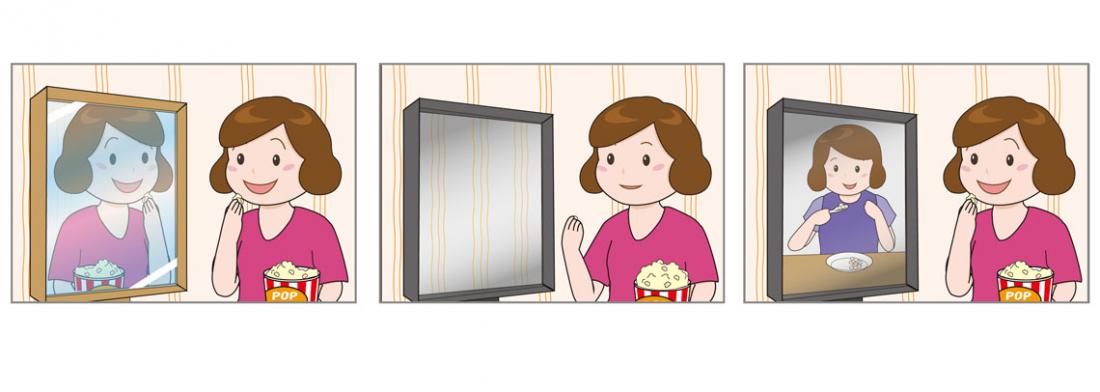A woman is eating popcorn alone in front of a mirror, or a monitor displaying a wall or her static image. People reported the popcorn as tasting better, and consumed more of it, when they ate it in front of a mirror, or even a picture of themselves eating, than when they ate it in front of the monitor displaying a wall.
Nagoya, Japan – People rate food as tasting better, and eat more of it, when they eat with company than when they eat alone. This so-called “social facilitation of eating” is a well-established phenomenon; however, exactly what it is about company that produces the effect is not clear.
Now, researchers at Nagoya University have discovered that the same effect can be achieved in individuals eating alone simply by providing a mirror to reflect them while they eat. The study was published in Physiology & Behavior.
“We wanted to find out what the minimum requirement is for the social facilitation of eating,” lead author Ryuzaburo Nakata says. “Does another person have to actually be physically present, or is information suggesting the presence of others sufficient?” The researchers found that people eating alone reported food as tasting better, and ate more of it, when they could see themselves reflected in a mirror, compared with when they ate in front of a monitor displaying an image of a wall.
The research team initially worked with a group of older adult volunteers. Approaches to enhance enjoyment of food in people eating without company are particularly relevant for elderly people, because research has shown that many frequently eat alone. However, when the team repeated the experiment with young adult volunteers, they observed the same “social” facilitation of eating when a mirror was present, suggesting that the effect is not limited to older people.
In a further experiment, when the researchers replaced the mirror with photos of the volunteers eating, they discovered that the volunteers still experienced an increase in the appeal of food and ate more. Thus, perhaps surprisingly, a static image of a person eating seems sufficient to produce the “social” facilitation of eating.
“Studies have shown that for older adults, enjoying food is associated with quality of life, and frequently eating alone is associated with depression and loss of appetite,” corresponding author Nobuyuki Kawai says. “Our findings therefore suggest a possible approach to improving the appeal of food, and quality of life, for older people who do not have company when they eat—for example, those who have suffered loss or are far away from their loved ones.”
The article, “The “social” facilitation of eating without the presence of others: Self-reflection on eating makes food taste better and people eat more”, was published in Physiology & Behavior at DOI: 10.1016/j.physbeh.2017.05.022.



